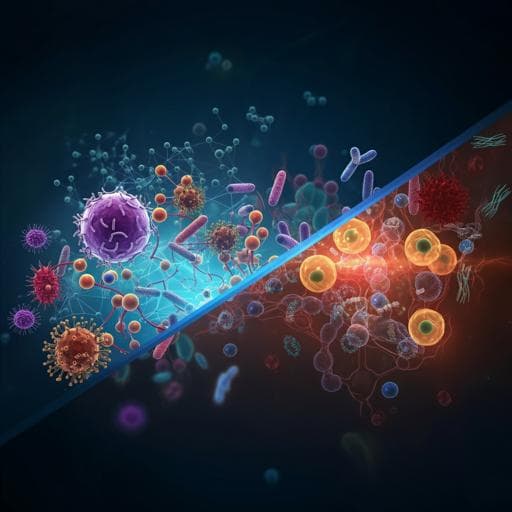
Medicine and Health
Divergent effects of ketogenic and vegan diets on human immunity, metabolism, and the gut microbiome
V. M. Link, K. D. Hall, et al.
The study investigates how short-term, controlled dietary interventions affect human immunity and the microbiome, an area with limited human data despite evidence from experimental models that nutrition and the microbiota shape host physiology and resilience. Prior work often examined a single diet, despite substantial interindividual variability in dietary responses. The research question centers on how distinct diets—ketogenic (low-carbohydrate, high-fat) and vegan (high-carbohydrate, low-fat)—differentially remodel human immune signatures, metabolism, and the gut microbiome in a rigorously controlled, randomized cross-over inpatient setting. The purpose is to delineate diet-specific immune and microbiome functional pathways and their interconnections, informing potential diet-based therapeutic strategies.
The paper situates its work within evidence that nutrition modulates physiology via fuel quantity/quality and microbiota interactions, with diet prominently shaping microbiome composition and function. Experimental models show diet–microbiota–immunity links, but human immune impacts remain underexplored. The authors reference: (1) robust diet-driven microbiome changes (including fiber gaps, environment over genetics, and rapid diet-induced shifts), (2) ketogenic diet effects in animals/humans (bile-tolerant bacteria increases, decreased Firmicutes, altered Th17 responses, γδ T cell activation), and (3) epidemiologic associations of dietary patterns with disease risk. They note prior work in the same clinical cohort showed higher ketone bodies during keto and lower caloric intake during vegan diet. Gaps include limited multi-diet, multi-omics human studies addressing immune outcomes and interindividual variability.
Design: Randomized, controlled, inpatient cross-over study at the NIH Clinical Center. Twenty adults (11 male/9 female; 18–50 years; weight-stable; no metabolic/cardiovascular/other diseases affecting metabolism) consumed two distinct diets ad libitum for 14 days each in random order without a washout: (1) Ketogenic low-carbohydrate, high-fat diet (~75.8% fat, 10.0% carbohydrate), and (2) Vegan low-fat, high-carbohydrate diet (~10.3% fat, 75.2% carbohydrate). Both diets shared a base of nonstarchy vegetables (~1 kg/day) with minimal highly processed foods. The ketogenic diet included animal-based products (meat, poultry, fish, eggs, dairy, nuts); the vegan diet included legumes, grains, soy products, root vegetables, fruits. The vegan diet was higher in fiber and sugars; participants on keto consumed more fatty acids and amino acids. Baseline intake was assessed by food questionnaire.
Sampling and assays: Blood and stool were collected at specified time points. Due to sample availability, not all assays included all participants.
- Flow cytometry (n=7): PBMC composition assessed via high-dimensional panels; major immune cell types quantified; neutrophils excluded due to processing viability. Manual gating strategies and statistical analyses (paired t-tests with multiple-testing correction) were used.
- Whole blood RNA-seq (n=6): Bulk RNA-seq, PCA, differential expression (limma), pathway enrichment (GSEA using Hallmark and BTM), IPA disease term analysis, and inference of contributing blood cell types using Human Protein Atlas datasets.
- Plasma proteomics (n=20): SomaScan HTS (SomaLogic) quantifying ~1,306 proteins; analyses via paired tests with multiple-testing correction, LME for diet order effects, tissue-of-origin annotations (Human Protein Atlas), functional enrichment (STRING), PCA including sex-stratified analysis.
- Microbiome metagenomics (n=10): Stool DNA extraction; assembly and taxonomic profiling (Kraken2/Bracken), diversity analyses (PCoA, PERMANOVA, beta-dispersion), functional profiling (HUMANN 3.0; EC and MetaCyc pathways), CAZyme profiling (dbCAN), statistical modeling (MaAsLin2 with LME), multiple-testing corrections; mapping reads to EC to infer functional pathway changes.
- Targeted metabolomics (n=20): Plasma and 24-h urine via UPLC-MS/MS (Metabolon); PCA, paired t-tests with corrections; pathway enrichment (MetaboAnalyst) with custom background; lipid subclass analysis (saturated/unsaturated/mixed FA content).
Integration: Pairwise correlations among microbial enzymes, metabolites, and proteins (Spearman; FDR-corrected); network analysis of highly connected features (>10 significant correlations) to identify cross-omic linkages.
Statistical considerations: LME models to test diet-order effects; ANOVA and paired tests for differential abundance; multiple-testing corrections applied throughout (Bonferroni-Hochberg/qvalue). Ethics: IRB-approved (NCT03878108), informed consent obtained, inpatient randomized cross-over protocol.
- Immune cell composition: Across diets versus baseline, naive CD8 T cells decreased, while activated CD4 T cells, effector CD4 and effector CD8 T cells increased. Diet-specific differences included higher activated regulatory T cells and CD16+ NK cells after ketogenic diet; higher activated T helper cells and activated NK cells after vegan diet (P<0.01, paired tests).
- Transcriptomics: PCA showed interindividual variation (PC1 ~37.4%) and diet effects (PC2 ~34.5%). Ketogenic diet enriched adaptive immunity pathways (T cell activation, B/plasma cell and NK signatures) and oxidative phosphorylation; vegan diet enriched innate immunity and antiviral/type I interferon signatures. Vegan diet upregulated erythrocyte differentiation and heme biosynthesis/metabolism (aligned with higher iron intake). IPA disease terms indicated increased lymphopoiesis with keto and increased erythroid and cancer-associated pathway activation with vegan (interpretation cautioned; not predictive of cancer risk/outcomes).
- Proteomics: Ketogenic diet produced the largest number of differentially abundant plasma proteins (baseline vs keto: 107; keto vs vegan: 137; baseline vs vegan: 21). Keto impacted proteins from multiple tissues (blood, brain, bone marrow), while both diets affected liver and secondary lymphoid organ-derived proteins. STRING enrichment supported heme metabolism up in vegan; insulin signaling relatively enriched at baseline vs keto. PCA showed sex-associated outliers, with females exhibiting larger proteomic shifts under keto.
- Microbiome composition/function: Beta diversity differed between ketogenic and vegan diets (PERMANOVA significant), with no alpha diversity differences. Phylum-level changes were modest between keto and vegan; species-level shifts occurred primarily within Actinobacteria, Bacteroidetes, Firmicutes, Proteobacteria (Firmicutes most impacted). Keto associated with increased bile-tolerant/animal-rich diet species (e.g., Bacteroides sartorii, B. vulgatus); vegan associated with fiber-rich species (e.g., Bifidobacterium longum, B. pseudocatenulatum). Functionally, keto led to broad downregulation of microbial EC gene abundance and pathways, notably amino acid (including BCAAs) and vitamins (B1, B5, B12) biosynthesis; enzymes aligned with plant polysaccharide digestion increased in vegan.
- Metabolomics: Plasma profiles separated clearly by diet; 185/859 metabolites differed between keto and vegan (54 up in vegan; 131 up in keto), especially lipids. Keto upregulated BCAA biosynthesis/degradation pathways and elevated plasma BCAAs; vegan specifically upregulated alanine, aspartate, glutamate metabolism and arginine biosynthesis. Urine showed fewer differences (Pantothenate/CoA up in keto). Lipids with saturated fatty acids were enriched in plasma during keto; unsaturated FA-containing lipids enriched during vegan.
- Multi-omics integration: Strong cross-correlations revealed a dense network linking proteins, metabolites, and microbial enzymes dominated by amino acid and lipid metabolism and immune features. Adaptive immunity-associated nodes were predominantly higher in keto; innate/antiviral signatures more linked to vegan. Overall, keto exerted broader effects on proteome, metabolome, and microbiome than vegan, while both diets significantly modulated immunity.
The findings demonstrate that 2-week dietary interventions can rapidly and substantially rewire human immune profiles, microbiome function, and host metabolic state, with diet effects superseding demographic and anthropometric differences. Ketogenic diet preferentially enhanced adaptive immune signatures (T/B cell and NK-related pathways and oxidative phosphorylation), while vegan diet enhanced innate immunity and antiviral/type I interferon pathways, and increased erythropoiesis/heme metabolism—potentially linked to higher dietary iron intake. Microbiome analyses showed keto shifted community composition and broadly suppressed microbial amino acid and vitamin biosynthesis, suggesting a host–microbiome functional trade-off in amino acid metabolism when dietary amino acids are abundant. Metabolomics corroborated strong keto effects (notably increased BCAAs and saturated FA-containing lipids) versus vegan (unsaturated lipids; specific amino acid pathway upregulation). The integrated network indicates coordinated regulation across omes centered on amino acids, lipids, and immune functions, with adaptive immune features more abundant under keto and innate antiviral features under vegan. Though exploratory, IPA disease terms suggested differing associations with cancer-related pathways between diets, warranting cautious interpretation and further validation. The work underscores the promise of diet-based strategies to modulate immunity and potentially influence disease contexts, pending larger and mechanistically targeted studies.
This controlled cross-over multi-omics study shows that distinct diets rapidly and divergently shape human immunity and the microbiome. Ketogenic diet broadly impacts proteome, metabolome, and microbiome, enriching adaptive immune programs and host amino acid/lipid metabolic pathways while downregulating microbial amino acid/vitamin biosynthesis. Vegan diet enhances innate and antiviral responses and upregulates erythropoiesis/heme metabolism, with characteristic shifts in lipid profiles and specific amino acid pathways. These results reveal interconnected diet-driven networks linking microbial enzymes, metabolites, and host proteins, suggesting actionable routes to modulate human immunity and metabolism via nutrition. Future work should expand cohort sizes, include washout and tissue-level immune profiling, disentangle caloric versus macronutrient effects, and explore clinical implications (e.g., cancer, infection) and sex-specific responses.
- Small sample sizes for several assays (flow cytometry n=7; RNA-seq n=6; microbiome n=10), limiting power and sex-stratified analyses for those datasets.
- No washout period between diets; however, analyses suggested diet order did not affect direction/magnitude of most effects.
- Immune profiling limited to peripheral blood; tissue-level immune responses were not assessed.
- Microbiome sampling limited to fecal material; potential changes at mucosal/epithelial or small intestine sites may be underrepresented.
- Differences in ad libitum caloric intake between diets (lower with vegan) may confound immune/metabolic signatures (caloric restriction itself can alter immunity).
- Not all assays performed on all participants; potential selection and missing data biases.
- Short intervention duration (2 weeks per diet); durability and kinetics of changes remain unknown.
- Unblinded dietary interventions by necessity; potential biases in behavior or compliance.
- IPA cancer pathway activations are associative and not indicative of disease risk/outcomes.
Related Publications
Explore these studies to deepen your understanding of the subject.







